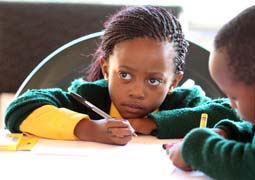
On the first day of a week-long programme of oversight visits to schools in the Western Cape, Parliament’s Portfolio Committee on Basic Education heard a number of concerns about administrative processes at the newly established “collaboration” schools.
The Committee heard that these schools are the brainchild of the Premier of the Western Cape and the MEC for education in the province to bring in private partnerships to assist schools. Organised teachers’ unions, the South African Democratic Teachers’ Union and the National Professional Teachers’ Organisation of South Africa (Naptosa), were unanimous in the view that “collaboration schools” are not provided for in the South African Schools Act.
Naptosa said discussions on the matter have collapsed, as the Western Cape government has gone ahead with the pilot project regardless of their concerns. The unions are concerned about how staff appointments are made at such schools, which they claim differ from appointment processes followed by other government schools, and raise questions about the powers of the operating partners.
The “collaboration school” model is based on a partnership between the education department, schools, donor organisations and non-profit organisations specialising in the practice of quality education. Philanthropic donors provide additional funding over and above our department’s investment in these schools.
All Committee members present indicated that this matter needed further discussions.
The issue of gangsterism, ill-discipline, drug use and shortage of educators were some of the other challenges highlighted during the first day of oversight visits. The Committee first had a meeting with several stakeholders, including Western Cape education officials, organised labour and several education bodies.
Committee Chairperson Ms Nomalungelo Gina said the Committee decided to visit Langa Seconday School, one of the schools used for the “collaboration schools” pilot project, as it was one of the underperforming schools in the province. She wanted to find out what the challenges are and how the Committee could assist in addressing those challenges.
Langa Secondary School Principal Mr Mrwebi Magugu told the Committee that of all the schools in that area, his school was mostly affected by gangsterism. “Since the beginning of this year we have lost four learners already. These killings do not happen at school, but over the weekend in the communities. However, afterward it does spill over, as it will then be revenge time.”
The Committee heard that due to its poor performance, the school also struggles to attract Grade 8 leaners. “We are normally the last choice when parents can’t find space for their children elsewhere,” Mr Magugu said.
Other challenges include big class sizes of over 50 students in certain subjects, such as Life Sciences. Magugu informed the Committee that one ICT class not functional.
The Committee also heard that in some primary schools, learners are told to do the writing for others. Then when these assisted students reach secondary school their reading and writing skills have not developed to the required standard.
At Tembani Primary School and Manenberg High School, the Committee heard that although both schools are facing similar challenges, the schools have increased pass rates every year. The oversight visit continues today.
Rajaa Azzakani
1 August 2017

